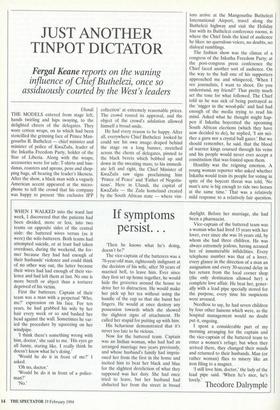If symptoms
persist.. .
WHEN I WALKED into the ward last week, I discovered that the patients had been divided, more or less, into two teams on opposite sides of the central aisle: the battered wives versus (as it were) the wife-batterers. Both teams had attempted suicide, or at least had taken overdoses, during the weekend, the for- mer because they had had enough of their husbands' violence and could think of no other way out, the latter because their wives had had enough of their vio- lence and had left them at last. No one is more bereft or abject than a torturer deprived of his victim.
First the batterers. Captain of their team was a man with a perpetual 'Who, me?' expression on his face. For ten years, he had grabbed his wife by her hair every week or so and bashed her head against the wall. Sometimes he var- ied the procedure by squeezing on her windpipe.
'I think there's something wrong with him, doctor,' she said to me. 'His eyes go all funny, staring like. I really think he doesn't know what he's doing.'
`Would he do it in front of me?' I asked.
'Oh no, doctor.' `Then he knows what he's doing, doesn't he?'
The vice-captain of the batterers was a 78-year-old man, righteously indignant at the decision of his wife, after 50 years of married hell, to leave him. Ever since they first set up home together, he would hide the groceries around the house to drive her to distraction. He would make her pick up her tea without using the handle of the cup so that she burnt her fingers. He would at once destroy any possession towards which she showed the slightest signs of attachment. He called her stupid for putting up with him.
His behaviour demonstrated that it's never too late to be vicious.
Now for the battered team. Captain was an Indian woman, who had had an arranged marriage two years previously, and whose husband's family had impris- oned her from the first in the home and incited him to beat her black and blue for the slightest dereliction of what they supposed was her duty. She had once tried to leave, but her husband had abducted her from the street in broad daylight. Before her marriage, she had been a pharmacist.
Vice-captain of the battered team was a woman who had lived 15 years with her lover, ever since she was 16 years old, by whom she had three children. He was always extremely jealous, having accused her of innumerable infidelities. Every telephone number was that of a lover, every glance in the direction of a man an assignation and every 30-second delay in her return from the local corner shop (the only destination allowed her) a complete love affair. He beat her, gener- ally with a lead pipe specially stored for the purpose, every time his suspicions were aroused.
Needless to say, he had seven children by four other liaisons which were, as the hospital management would no doubt put it, ongoing.
I spent a considerable part of my morning arranging for the captain and the vice-captain of the battered team to enter a women's refuge; but when they arrived there, they changed their minds and returned to their husbands. Man (or rather woman) flies to misery like an iron filing to a magnet.
'I still love him, doctor,' the lady of the lead pipe said. 'When he's nice, he's lovely.'
Theodore Dalrymple


















































 Previous page
Previous page